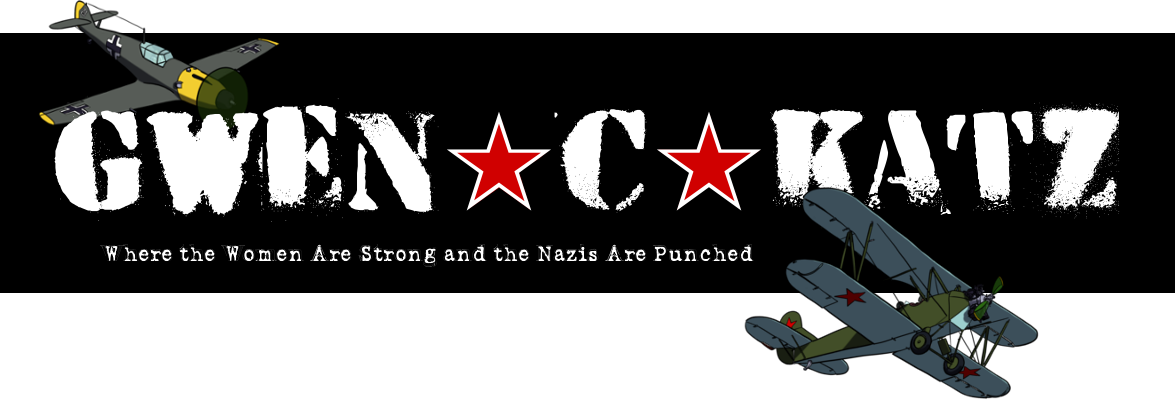The war ended 70 years ago, but the Women’s Airforce Service Pilots (WASP) have only just won their final battle: On Friday, Congress passed a law finally allowing them to be interred at Arlington Cemetery. It’s a triumphant moment for the WASP, whose history is emblematic of the military’s troubling attitude towards women in the service.
 The US military, like most militaries, has a long history of using its human resources when it needs them and abandoning them when it doesn’t, and it’s treated few groups as shamefully as the women’s branches. Created during World War II to meet increasing personnel demands, these groups included the Army WACs, the Navy WAVES, the Coast Guard SPARs, and the Marine Corps Women’s Reserve (I’ll get to the WASP later). Recruitment campaigns encouraged women to enlist, emphasizing both their patriotic duty and the benefits of a military career. Recruitment videos describe the various interesting jobs available and how they can lead to future civilian careers. Some 350,000 American women served in the military over the course of the war, filling clerical positions and other noncombat roles.
The US military, like most militaries, has a long history of using its human resources when it needs them and abandoning them when it doesn’t, and it’s treated few groups as shamefully as the women’s branches. Created during World War II to meet increasing personnel demands, these groups included the Army WACs, the Navy WAVES, the Coast Guard SPARs, and the Marine Corps Women’s Reserve (I’ll get to the WASP later). Recruitment campaigns encouraged women to enlist, emphasizing both their patriotic duty and the benefits of a military career. Recruitment videos describe the various interesting jobs available and how they can lead to future civilian careers. Some 350,000 American women served in the military over the course of the war, filling clerical positions and other noncombat roles.
But when the war ended, there was a sudden change of attitude in the military. The personnel shortages over, the women’s branches were no longer needed. What’s more, thanks to the 1944 GI Bill, the government was faced with the prospect of providing generous benefits to 16 million veterans, women included. What had been an asset was now a liability. Meanwhile, the public’s attitude was shifting too. Prewar norms about the roles of men and women returned. While male veterans commanded respect, female veterans faced unflattering stereotypes that they were bossy, masculine, promiscuous, and probably a bunch of lesbians.
All in all, the military found it in their best interest to get rid of the women as efficiently as possible, preferably without honorable discharges. The WACs and WAVES went through a series of anti-lesbian purges in the postwar years, during which thousands of women received undesirable blue discharges. Veterans with blue discharges didn’t receive benefits and faced discrimination in employment and education—and unlike a dishonorable discharge, this classification didn’t require a court-martial.
Needless to say, as male GIs returned and pushed women out of the workforce, the promised civilian-sector jobs didn’t materialize, either.

When it came to the WASP, the task was much simpler. It was an auxiliary organization, not technically part of the military. Even those who died in crashes were denied military funerals. Director Jacqueline Cochran’s repeated efforts to militarize the WASP failed. Therefore, when they were disbanded in late 1944, WASPs were not veterans and were entitled to no benefits. After the war, all records of the WASP were classified. For the next 35 years, it was as if they had never existed.
Justice for the WASP had to wait for a cultural shift. In the 1970s, as ideas about the role of women began to change, their story came to light, and in 1977, their records were unsealed and the WASP were finally given full military status. And in 2002, for the first time, they were eligible to be interred at Arlington Cemetery (along with the Merchant Marines, another neglected group). The WASP were finally getting the respect they deserved.
But last year, the WASP received a rude surprise: Army Secretary John McHugh issued a directive once again banning them from interrment at Arlington. This was part of a move toward more stringent eligibility rules for interrment due to Arlington’s rapidly dwindling remaining space. Why a group of just 1000 individuals, few of whom are still living, would create a space problem is a mystery, but it marks another point in a depressing trend: Whenever they become inconvenient, women in the military get the shaft.
A petition by the granddaughters of WASP Elaine Harmon brought this issue to national attention, and for now, at least, WASPs have the rights they earned all those decades ago. But McHugh’s directive is a sobering reminder that even the most hard-fought victories are never permanently won. Regressive cultural forces continually seek to strip women of their rights and diminish their accomplishments. The military still marginalizes women when they become inconvenient: Sexual assault victims are often less than honorably discharged if they complain, sometimes on the grounds of the same “personality disorders” that were once used to discharge gays and lesbians.
The WASP have done their part. It’s our fight now.

Permalink
. Even those who died in crashes Director Jacqueline Cochran’s repeated efforts to militarize the WASP fail
I feel like you maybe deleted something here?
Yeah, the way we treat our veterans is shameful. Some give all, all give some, and none get much. You’d think with all the money we spend on our military, some of it would actually go to the people who risk most.
(Also, guess who’s in a science comics anthology? :D)
Permalink
One of these days I will post something without a half-finished sentence in it. BUT TODAY IS NOT THAT DAY.